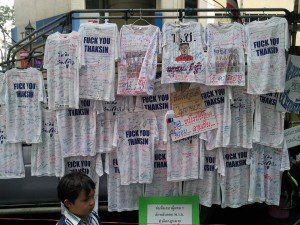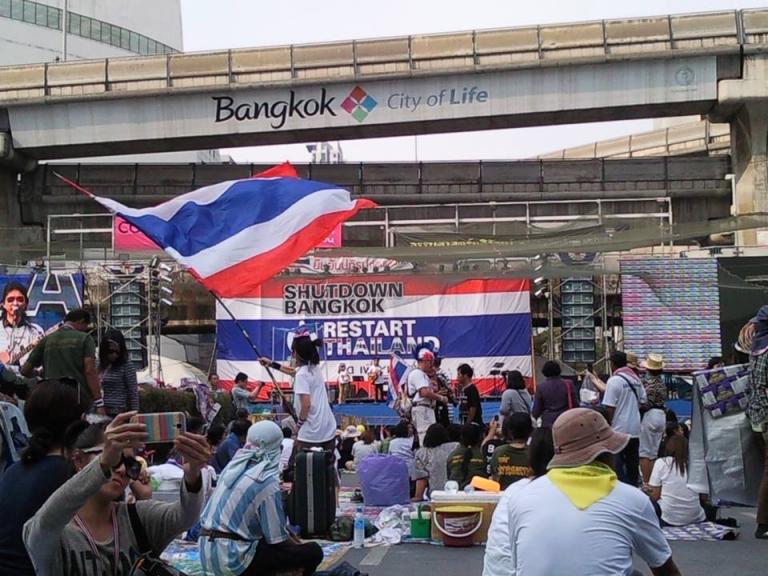I’ve been ‘aware’ of Thailand since I was an intelligence-analyst in the US Air Force, stationed in Germany, around early 2001. I watched on CNN as Thaksin Shinawatra was expected to win the elections, and immediately I felt I did not like this guy. I would soon leave the USAF after a decade of service, to become a fully-ordained world-renouncing Theravada Buddhist-monk. I’ve taken keen interest in Thailand’s political turmoil. I witnessed the horror of the daily killings on the mid-2000’s, when Thaksin Shinawatra’s police force was killing some 2600 people without trials, merely on the suspicion that they were drug users or sellers, we all witnessed the horror of the Tak Bai incident and Krue Se mosque episode where innocent Muslim-men were killed by Thaksin Shinawatra’s extended-arm. The nation’s spirit was leaving, it was being corrupted by populist-schemes and behind-the-scenes politics. Thaksin Shinawatra’s final straw was when he sold off his telecommunications company to a foreign-group tax-free. He’s exploited Thailand for his own personal benefit. The 2006 Army Coup was the attempt to restore Thailand to normalcy, and after an appointed Prime Minister, who did little besides appeasing former communists and advocating for the King’s Sufficiency Economics (a subject I teach in my Buddhist Economics lectures), the next few “democratically-elected” governments were party-minions of the Thaksin regime, including his brother-in-law and another close associate who died shortly after his election. Another election brought in Thaksin’s very own sister. She is seen and performing as nothing but a puppet of her elder-brother, most recently disappearing from public-view and only posting things on her Facebook-page.

As a scholar of both Thai Studies and Buddhist Studies, I am keenly interested in these developments. One day, when the Yellow-shirts were protesting near Thammasat University, I had to walk home because the public-buses were not running because of the protests. I had to duck-under the razor wire, in order to get to another road, so I could walk home. Two Yellow-shirt demonstrators armed with wooden-sticks and other home-made weapons enthusiastically assisted me by lifting up the wires. It was a very kind and generous offer. I watched the Yellow-shirt protests with appreciation, seeing the Thai people coming together to reject a corrupt Prime-minister was really emotionally-moving. As friends or associates were becoming polarized, I saw more truth with the Yellow-shirt forces, and sided with them.
I was curious about the Red-Shirt protesters. I could never seem to trust what I was hearing from them, shouting from the stages like crazed beasts. I really, really wanted to support the poor or underprivileged. My appreciation of Buddhist-socialism allowed me to be compassionate yet still distant. A lot of the protesters were bused in and paid to be mere bodies for the regime. Their camp-sites along the road were in squalid conditions: reeking of fecal-matter and urine – many of these people had little regard for personal hygiene. These Red-mobs were terrorizing the government of Abhisit Vejjajiva, to the point where the events basically terminated when Wat Patumwanaram became a site where some people were murdered by armed-men-in-black, allegedly government soldiers, but everyone knows that Thaksin Shinawatra has a personal army of former police mercenaries to carry out his whims: many of them killing 2600 other innocents.
Currently, the anti-government protesters or demonstrators are renouncing the government of Yinglack Shinawatra, because of her lies and more lies (six months of false promises) towards rice-farmers. The Shinawatra family (Yinglack’s husband is involved in the CP company – one of the largest meat-processing companies in the nation, and one of the other leading families in Thailand), continues to profit from Thai-people. Do you want to use a phone in Thailand? There are other companies to support besides a Shinawatra-owned enterprise; further it was revealed that somehow the family is also involved with Nestle (a famous brand making too many consumable products) – it is hard to avoid contributing to the pockets of the Shinawatras. They pervade Thai society. On several occasions, I have attended the anti-government demonstrations at the Ratchaprasong Stage and the Patumwan Stage. Additionally, my wife’s father and her sister are not being paid by the government’s rice-scheme, so the the issue is affecting my family.
I’ve also attended the Chaeng Wattana Stage ran and organized by the charismatic monk: Venerable Buddha-Isara. I’ve heard a lot of press about him, and I decided to determine for myself, through my own six-senses: what is he really all about? I attended my first Venerable Buddha-Isara sermon on Makha Puja Day, and donated some money to him, to show my appreciation for his stance and as my support to his cause and the cause of the PDRC, to eliminate corruption from Thailand. I have, since, returned to Ven. Buddha-Isara’s stage on three occasions. He usually, according to my experience: gives a morning sermon which covers the previous-day’s news, and his reaction to it. His reaction will illuminate some aspect of the Buddha’s teaching (for instance, I recall part of his sermon about “vaca” or proper uses of speech). He also emphasizes keeping the camp-sites clean, pick up the trash and put it in the proper containers, and also as part of his sermon: rejects the personal donations, instead giving that to the camp-support agents for getting water, food, medicine or other necessary items for the general-hospitality and well-being of the camp-dwellers at the protest-stage. As a sort of stage-site abbot, he looks after his disciples, or rather brothers and sisters in the struggle against corruption. He repeatedly calls for unity in his sermons: denouncing the terminology of red-shirts or yellow-shirts since the government’s failed rice-scheme does not discriminate based on shirt-color. All of the rice-farmers were harmed in this scheme, it transcends color. Venerable Buddha-Isara’s messages to unite against corruption most recently came to light when he attempted to book 10 rooms in a certain hotel owned partially by the Shinawatras, in order to hold a conference with government-leaders, but the hotel-manager refused to lend the rooms to the bhikkhu.
I attended the sermon the next morning, and have it recorded as an audio file on my mobile phone. In this sermon, he begins by covering the daily news, and looked directly at me (recalling that I was there a few days ago for Makha-Puja Day), and jokingly-suggested that next time, I get the 10 rooms for him! The true spirit of this strife is to purify the Thai nation from the stain of Thaksin-based capitalism that is corrupting and destroying the nation. When I see that my own university is supporting the corrupt-government, the leading Buddhist university in Thailand, it really makes me stop and wonder what Buddhism is really all about? In this murky red-sea, it can be hard to view a clear blue-sky. A blue sky is one without clouds, without inhibitors, where people can see all that light enables. Light though, as I teach, blinds us to the ultimate reality of the universe – which avails itself in the midnight hours. Universally, these are just little insignificant factors, but together they are all part of a larger structure. Wisdom is the light of the world, as the university slogan suggests – yet 75% of the university is in cahoots with the corrupt-regime? People are shocked when I mention I come from “MCU” to support the PDRC, yet it is like leaving the enemy-camp and being welcomed by really good people. My university also has trouble paying lecturers: often we get our lecturing fees two or three weeks late. In conclusion: the society is sick, and we need to be healed from certain viruses. We need new ways to think and govern ourselves. We can only do this when our kilesas are purged from our system.
Respectfully,
Dr. Dion Peoples
Lecturer, Faculty of Buddhism (since 2006)
(Current courses: Religions, Religions & Sociology, Buddhist Economics, and Professional Development, and others in the past…)
Mahachulalongkornrajavidyalaya University, Thailand.













